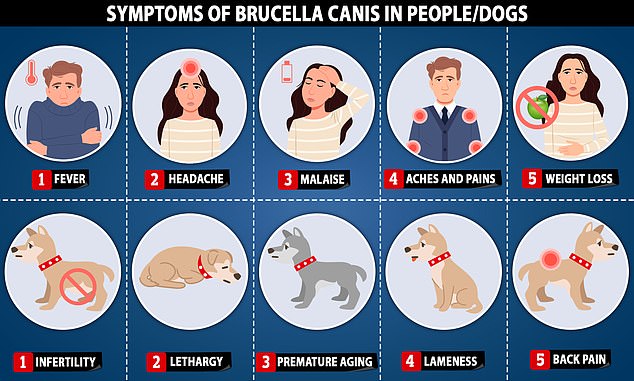Two South Carolina families were exposed to a rarely discovered bacteria, Brucella canis, while caring for a pregnant stray dog
Two South Carolina families, five of their pets and eight veterinarians were all exposed to dangerous bacteria after caring for an infected dog and her puppies.
A stray dog taken in by a foster family and soon after adopted into a permanent family was found to harbor the Brucella canis bacteria, leading to the death of her offspring and infertility.
B. canis can be transmitted from dogs to humans through contaminated bodily fluids. The CDC reports that the foster home that took in the dog treated her deceased puppies without wearing protective gear, raising concerns that they could be infected.
The bacteria can cause fatigue, premature aging, lameness and back pain in dogs and headaches, muscle aches, chills and fever in humans.
In severe human cases, the bacteria can also lead to life-threatening heart infections, an enlarged spleen or neurological symptoms.
However, it often goes unnoticed as some dogs may be asymptomatic and there is no test to detect B-canis in humans.
Brucella canis is a canine disease that mainly occurs in animals imported from Eastern Europe. It can also infect humans (stock image)

Brucella canis can infect both humans and dogs, but causes different symptoms
According to a CDC alert about the exposure, no one in either family appeared to have contracted the bacteria.
In September 2023, the South Carolina Department of Health and Environmental Control was notified by a veterinarian that several people had come into contact with a dog carrying the bacteria.
The dog was a pregnant stray that had spontaneously aborted – a symptom of B. canis infection.
The dog had ended up on the property of a family of four who had a dog of their own in August 2023. They fostered the dog for two weeks, after which the dog was adopted by a family of five, consisting of a baby and a toddler, and two dogs and two ferrets.
The dog’s new family took her to the vet when they noticed vaginal discharge and learned that her puppies had recently died. The vet performed a B canis screening test, which came back positive.
Dogs can become infected by mating with an infected animal or by coming into contact with contaminated semen, vaginal or menstrual secretions. If an infected dog is pregnant, it can transmit the bacteria to its puppies in the womb, during birth, or while they drink its milk.
In humans, an infection occurs when material contaminated with Brucella canis comes into contact with people’s mucous membranes, for example their eyes and mouth, or through an open cut in the skin.
People can also get Brucella canis through other biological material that infected dogs produce, such as urine or feces. However, the chance of this is much smaller.
According to the CDC, “A total of 17 people and five animals were exposed to the dog, including the foster family (and their dog), the adoptive family (and their two dogs and two ferrets), and eight veterinary clinic employees. ‘
The agency added that three members of the adoptive family had directly handled aborted materials and puppies without wearing personal protective equipment.
Because of this high-risk exposure, they were given post-exposure preventative medications and monitored for symptoms for 24 weeks.
Symptoms usually develop within three to four weeks of infection.
The CDC continued, “All other exposed individuals and animals, including the foster home and their dog, were at lower risk of exposure, including collecting samples while using personal protective equipment, feeding, petting, and walking the dog or, in the case of the ferrets, during informal contact with the family.
“They were told to watch for symptoms. After 24 weeks (after exposure), none of the exposed individuals reported symptoms in themselves or their pets.”
The infected dog was humanely euthanized. This is the only approved treatment for an infected dog.
However, no human deaths have been reported due to B canis infection. The vast majority of infections are mild and can be treated with antibiotics. However, serious infections of the heart wall, bones, brain tissue and blood have been reported.
